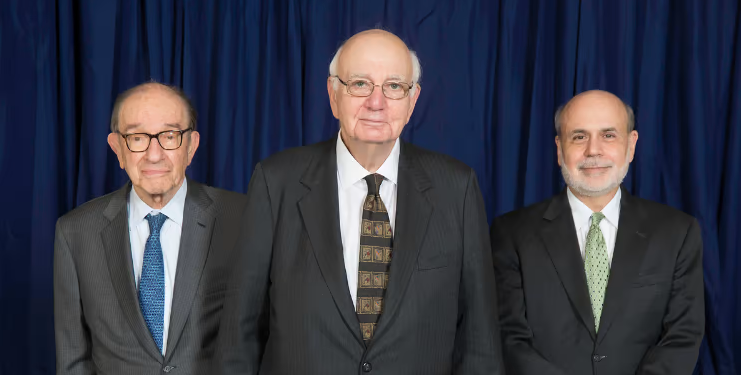The Spanish-American philosopher George Santayana famously warned that “those who cannot remember the past are condemned to repeat it.” But sometimes even those who can recall the past have a selective memory and draw the wrong conclusions. This is how the global policy response to the current bout of inflation is playing out, with governments and central banks across the developed world insisting that the only way to tame soaring prices is by raising interest rates and tightening monetary policy.
The Volcker shock of 1979, when the US Federal Reserve, under then-chair Paul Volcker, sharply increased interest rates in response to runaway inflation, set the template for today’s monetary tightening. Volcker’s rate hikes were intended to combat a wage-price spiral by increasing unemployment, thereby reducing workers’ bargaining power and depressing inflationary expectations. But the high interest rates triggered the largest decline in US economic activity since the Great Depression, and recovery took half a decade. Volcker’s policy also reverberated around the world, as capital flowed into the United States, resulting in external debt crises and major economic downturns that led to a “lost decade” in Latin America and other developing countries.
But the context for this heavy-handed approach was very different from current conditions, because wage increases are not the main driver of inflationary pressures. In fact, even in the US, real wages have been falling over the past year. Yet that has not stopped some economists from arguing that higher unemployment and consequent larger declines in real wages are necessary to control inflation.
Even some of the most vocal champions of tight money and rapid interest-rate increases recognise that this strategy will most likely trigger a recession and significantly damage the lives and livelihoods of millions in their own countries and elsewhere. There also seems to be little disagreement that rate hikes have not slowed inflation thus far, probably because surging prices are driven by other factors.
One would expect the supposed “adults in the room” of global macroeconomic policy to recognise the problem and seek to craft more appropriate responses. But national policymakers in advanced economies, as well as multilateral institutions such as the International Monetary Fund and the typically more sensible Bank for International Settlements, appear to have no interest in alternative explanations or strategies.
This intellectual inertia is leading policy badly astray. Research has increasingly shown that the current inflationary surge is driven by supply constraints, profiteering by large companies in critical sectors like energy and food, and rising profit margins in other sectors, as well as commodity prices. Addressing these factors would require sensible policies such as mending broken supply chains, capping prices and profits in important sectors like food and fuel, and reining in commodity-market speculation.
While governments are well aware of these options, they did not seriously consider them. Instead, elected officials worldwide left it to central banks to control inflation, and central bankers, in turn, have relied on the blunt tools of interest-rate hikes. While this will inflict needless economic pain on millions of people in developed countries, the consequences for the rest of the world will likely be even worse.
Part of the problem is that the macroeconomic policies of the world’s major advanced economies focus solely on what they perceive as their national interest, regardless of the impact on other countries’ capital flows and trade patterns. The 2008 global financial crisis originated in the US economy, but its impact on developing and emerging economies was far worse, because investors fled to the safety of US assets. And when the massive liquidity expansions and ultra-low interest rates that followed in developed countries caused speculative hot money flows to spread worldwide, low- and middle-income countries were exposed to volatile markets over which they had little to no control.
Similarly, today’s rapid monetary tightening has revealed just how lethal such integration can be. For many developing and emerging economies, financial globalisation is akin to an elaborately-built house of cards.
An important new paper by Dutch economist Servaas Storm shows the extent of the collateral damage that monetary tightening could cause in low- and middle-income countries. Interest-rate hikes in the US and Europe will likely result in more debt crises and defaults, significant output losses, higher unemployment, and sharp increases in inequality and poverty, leading to economic stagnation and instability. The long-term consequences could be devastating. In its latest annual Trade and Development Report, UNCTAD estimates that US interest-rate increases may reduce the future income of developing countries (excluding China) by at least $360 billion.
Of course, rich countries cannot remain immune to this amount of damage. While policymakers in the US and Europe do not consider their policies’ impact on other countries, the effects are bound to spill over into their own economies. But for low- and middle-income countries, the stakes are much higher. To survive, developing and emerging economies must seek greater fiscal autonomy and monetary-policy freedom that would enable them to manage capital flows differently and refashion trade patterns.
As the ongoing COVID-19 pandemic and climate crisis have shown, pursuing greater multilateral cooperation and an equitable recovery is not just about kindness or morality; doing so is in the enlightened self-interest of rich countries. Tragically, however, hardly anyone in those countries – least of all their economic policymakers – seems to recognise that.
The writer, Professor of Economics at the University of Massachusetts Amherst, is a member of the UN Secretary-General’s High-Level Advisory Board on Effective Multilateralism. ©Project Syndicate







































